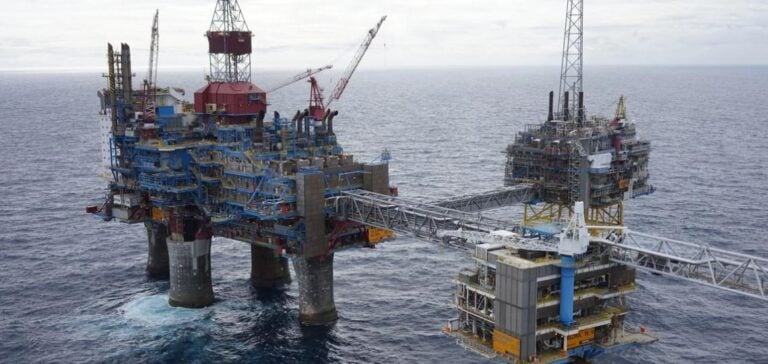Norway, Europe’s main gas supplier since 2022, saw its gas exports fall sharply on Monday due to the shutdown of the Sleipner offshore hub. The disruption also put the Nyhamna onshore processing plant, operated by Gassco, out of service, causing European gas prices to soar to their highest level this year.
Background and impact on prices
An incident on Sunday on the Sleipner Riser platform led to the shutdown of operations, said Alfred Hansen, pipeline system operations manager at Gassco. The Sleipner Riser platform is a crucial connection point for the Langeled North and Langeled South pipelines, linking the Nyhamna plant on Norway’s west coast to the Easington terminal in Great Britain. Following this incident, Norwegian gas nominations dropped to 251 million cubic meters (mcm) per day, compared with 300 mcm/day on Friday, according to Gassco data. As a result, the reference price for gas in Europe, the Dutch front-month contract, rose by 8.1% to 37.40 euros/MWh, its highest level since mid-December.
Operator feedback and outlook
Gassco is working with Sleipner operator Equinor to find an operational solution. However, Hansen added, there is still uncertainty as to whether these problems will be resolved quickly. Shell, operator of the Nyhamna plant, confirmed that the problem was linked to Sleipner, while an Equinor spokesman referred questions to Gassco. The Nyhamna plant, capable of processing up to 79.8 mcm per day, is currently closed, resulting in an actual loss of 56.7 mcm on Monday. The Easington terminal in Great Britain, with a capacity of 72.50 mcm/day, was also taken out of service due to upstream restrictions.
Consequences for the future
Both facilities will remain closed on Tuesday, according to an update on the Gassco website. This prolonged shutdown could exacerbate the situation on the European gas market, which has already been tense since the war in Ukraine and the reduction in imports from Russia. Europe’s growing dependence on Norwegian gas highlights the vulnerability of the European energy market to unforeseen interruptions. Market players will be closely monitoring developments to assess the long-term impact on prices and gas supply stability.
The incident highlights the importance of diversifying sources of supply and investing in resilient infrastructure to ensure long-term energy stability in Europe.






















